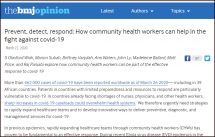Prevent, Detect, Respond: How Community Health Workers can Help in the Fight against COVID-19
In previous epidemics, rapidly expanding healthcare teams through community health workers (CHWs) has proven to be fundamental to an effective response. During recent Ebola virus disease (EVD) epidemics in the Democratic Republic of Congo (DRC) and west Africa, nations like Liberia, Sierra Leone, Guinea, Nigeria, and the DRC rapidly hired, trained, and equipped thousands of CHWs from communities affected by or at risk of Ebola.
As part of interdisciplinary teams of nurses, doctors, and other health workers, CHWs played a vital part in reducing transmission through promoting social distancing and contact tracing, detecting and referring individuals with suspected EVD for testing, and encouraging EVD patients to seek care early.
Countries in sub-Saharan Africa are already using CHWs to conduct community surveillance and contact tracing, as well as promoting sanitation and hygiene messages that are critical to preventing the spread of covid-19. Liberia, for instance, is leveraging its National Community Health Assistant Program, which has a strong track record of disease surveillance and expanding routine healthcare delivery, to strengthen COVID-19 preparedness and response. This article looks at the ways in which CHWs can be used to help prevent, detect, and respond to covid-19, with some examples of how Liberia is already doing this:
Last modified: July 21, 2020
Language: English

